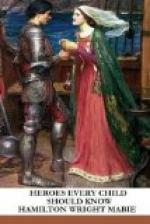When the enemy saw that the King and his men had landed, they sent a message to the Sultan by carrier-pigeons; this they did three times. But it so chanced that the Sultan was in a fit of the fever which troubled him in the summer time, and he sent no answer. Then his men, thinking that he was dead, for they knew already that he was sick, fled straightway from the town of Damietta. When the King knew this for certain, the bishops that were in the army sang the Te Deum with great joy. The army which King Louis brought with him numbered thirty thousand men.
The army being thus established in the town of Damietta, there was much debate as to what should be done. The King was set upon assailing the enemy without delay. “It is by delay,” he said, and said truly, “that these enterprises have been ruined heretofore, for not only does an army grow less and less with every day by sickness--keep it as carefully as you will, such loss must needs happen—but the first fire of zeal begins to burn low.” To such purpose the King spoke to his counsellors, nor could they gainsay his words. Yet they had to urge on the other part reasons so weighty that they could not be resisted.
The truth is that there could not have been chosen a worse time for the waging of war in Egypt than that at which the King arrived. Whereas other rivers overflow their banks in the winier season, the Nile overflows his in summer, and this he does because his stream is swollen, not by rains that fall in the land of Egypt, for such rains are more scanty than in any other country of the world, but by those that fall in countries far inland and, haply, by the melting of snows. So it is that in that part of Egypt which is nearest to the sea the river begins to rise in the month of June, and for a quarter of a year or so thereafter an army must rest perforce. The King was very ill served in his ministers when he was suffered to remain in ignorance of these things. Nevertheless, the case being so, he had no choice but to accept the counsel of delay. It was agreed, therefore, that the army should tarry in Damietta till the floods of the river should have ceased.
In the beginning of the month of December the King set out for Cairo with his army. Now the Sultan had sent five hundred of his knights, the bravest warriors and the best mounted that he could find in his whole army, to the end that they should harass the King’s army as much as might be. Now the King being very careful of the lives of his men, as knowing that a soldier lost could not be replaced, had given a strict commandment that no one should presume to leave the line of march and charge the enemy. When the Turks saw this, or, haply, had learnt from their spies that the King had given this commandment, they grew bolder and bolder, till one of them, riding up to the line, overthrew one of the Knights Templar. This was done under the very eyes of the Master of the Temple, who, when he saw




